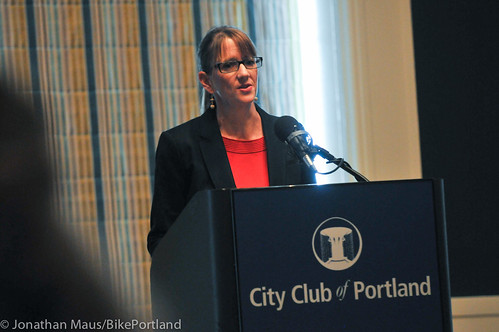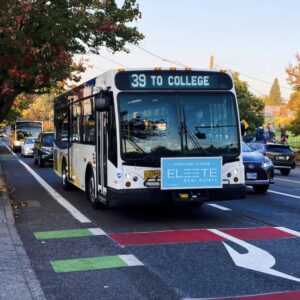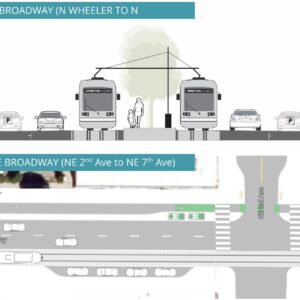Portland Bureau of Transportation Director Leah Treat hit mostly familiar notes today during her first major speech since taking over the agency last summer. Treat was hosted by the City Club of Portland and the event was included in the agenda of the annual Oregon Active Transportation Summit.
While she didn’t make any major policy commitments or launch new initiatives that might have sent the crowd of local transportation advocates and insiders abuzz, Treat gave us a glimpse of her perspective and offered clues about where she might take us during her tenure. She laid out her justification for investing in better biking and walking access and touched on big issues like Vision Zero, bike share, Safe Routes to School, getting tougher on speed enforcement, equity and investment in east Portland, the City’s efforts to pass a transportation fee, and more.
“Every death on our roadways is a failure of government, a failure of our community, and a failure we refuse to accept.”
— Leah Treat
From the beginning of her speech to the end, it’s clear that Treat is someone who is looking past the auto-dominated status quo. She called the removal of the Harbor Drive Freeway over 40 years ago (and its replacement as a public park) as, “an incredible statement about the importance of walking, biking and the human experience over the movement of vehicles.” Treat is someone who doesn’t believe the purpose of streets is just to facilitate driving and commerce, but that they are a play for “connecting us” and a “place to play.”
The conversation about transportation, Treat said, should start with our values and a simple question: “What kind of city did we want for ourselves and our children?”
Currently Treat feels that Portland’s streets are far too dangerous. In the line that has generated the most attention, Treat referred to traffic as a “growing public health crisis.” Here’s a snip from that part of her speech:
“We had 36 traffic fatalities in Portland in 2013. Last year, twice as many people died in traffic than in murders in our city. This is terrible. Who among you could look around this room today and pick out the 36 people you are willing to sacrifice to a traffic fatality? This can’t continue.”
Treat devoted a large part of her speech to outlining her support of Vision Zero, which she defined as the belief that “every death on our roadways is a failure of government, a failure of our community, and a failure we refuse to accept.” To put that belief into action, Treat said PBOT will make safety a top priority. “We will put it above methodologies like Level of Service.”
Going further, Treat connected Vision Zero to the importance of speed enforcement and the need for the use of fixed speed cameras. “Areas around schools, parks, hospitals, day cares, and nursing homes,” she said, “should be speed free zones. When we see a technology that can help us reduce speeding by that much, our whole city should be ready to work together to place them on our streets.”
Currently, PBOT has limited legal authority to use fixed speed cameras, but with support from the Bicycle Transportation Alliance, we won’t be surprised to see action on this issue in the 2015 Oregon Legislative session.
“If it’s safer for a kid to bike to their friend’s house to play, or a blind person to walk to the store, it’s actually safer to drive.”
— Leah Treat
In addition to more red light cameras Treat said she would support a tax on alcohol that would be dedicated to traffic safety programs and infrastructure.
When it came to bike share, despite agonizing delays, Treat echoed City Commissioner Steve Novick’s enthusiastic support for Portland’s system. Treat say they’re “on track to figure out a sustainable way to deliver it.”
Bike share came up again during the Q & A session, and with Treat being forced to speak off-script, she had an interesting response. You could tell she was choosing words carefully about this sensitive topic.
The question asked about the funding model Portland has decided to take. That is, asking a private sponsor to step up and fund the up-front capital costs, instead of using city funds. Here’s how Treat responded:
“To answer your comment about the funding for our bike share system. It is, um, very unusual.. and um, there’s a part of me that, um… It’s a public transit system and asking for a private sector company to take on full risk of a bike share system is I think, um, it’s a question mark. They did it first in New York and we’re trying to do it here. We haven’t produced a sponsor in two years and so it’s a question mark.
It’s a transit system with huge capital outlays with huge benefits to our community. We’ll see if this can be done. We’re working diligently with Alta, we’re very close to having a sponsor. But, I think, despite the heartache that we haven’t been able to announce as we’d really hoped, the good news is that because bike share is becoming so accepted and mainstream there are new companies now launching all over, so I’m convinced there are several people working in garages and in factories developing the next bike share system so maybe we’ll benefit from something that’s going to get developed over the next year. I don’t know. But it’s an emerging, growing industry with a lot of change. And I think taking a pause on launching it is actually a good thing and the city can benefit from waiting because we need to do it right to be successful.”
“Taking a pause” is an interesting way to describe PBOT’s current take on the project. From her answer, it appears like PBOT has no plans to launch bike share any time soon.
Another notable moment in the Q & A came when a man asked Treat to explain if the City has any plans on how to tie active transportation projects to housing and land-use policy. At first she told the man she didn’t really understand his question. Then the moderator from City Club helped her out by re-phrasing the question like this: “How does your work at PBOT intersect with land-use planning?”
Treat responded by saying, “Well, I am not a land-use planner. I will be very honest about it. My background is in finance and I have staff that works with BPS [the Bureau of Planning and Sustainability] and they are working on updating the TSP [Transportation System Plan].” She then explained how two large developments projects are impacted the conversation on the 20s Bikeway project (which is something she shared with me during an interview last week).
While it could have been a mental blip, this non-answer about two things — active transportation and land-use — that are so inextricably linked, definitely raised some eyebrows.
With many Portland transportation advocates waiting for a bold and clear vision forward, Treat’s speech seemed to fall a bit short. In the brief pulse I took of various people who were there, it seemed folks were underwhelmed in general. But Treat did make it clear that she is eager to work with the community to have priorities bubble up from the grassroots.
“As your director, I’m capable of creating political will,” She said in response to a question about having optimism for the future, “Change comes from the ground up and from communities asking for it… The people that show up are the vocal minority and without the groundswell of support, we can’t do it alone.”
— Download a PDF of Treat’s entire speech here. City Club says they plan to release the full audio soon. If you were at the event today, we’d love to hear your thoughts..








Thanks for reading.
BikePortland has served this community with independent community journalism since 2005. We rely on subscriptions from readers like you to survive. Your financial support is vital in keeping this valuable resource alive and well.
Please subscribe today to strengthen and expand our work.
I wonder if PBOT will demand return of the $40,000 already paid to Alta (as reported by the Mercury), since the contract terms on the bike share project to trigger that payment have not yet been met?
http://blogtown.portlandmercury.com/BlogtownPDX/archives/2014/04/18/secure-v-succeed-in-obtaining-something-esp-with-difficulty
Before PBOT asks each of us to pay a street fee, it should probably implement tighter controls over the taxpayer funds it pays out to consultants, contractors, etc to ensure that they are actually entitled to the funds requested.
Ms. Treat needs to come clean very soon about whether or not the
grant application was truthful. Take a moment to contemplate what it would mean to be untruthful in a state grant application for 2.5 million dollars. What would that say about PBOT?
I was there, and I was very happy to hear her vision for Portland’s streets: fixed speed cameras, prioritizing the safety of our most vulnerable road users (kids and elderly), Vision Zero, small parks and gardens instead of paving every gravel road.
(That room was dark and stuffy and I’ve got to be honest, the City Club needs to pick a better venue. That hotel is underwhelming.)
Vision Zero is fantastic. I wish her/us well. But I think we all know that the only way we’re going to make any headway with that is if we focus on the source of all the danger: cars. Reducing speeds, enforcement of the rules we have, and, ultimately, continuing to find ways to discourage the amount of driving.
But a tax on alcohol?!
I have a better idea. Why not tax that other liquid, the one that folks put in their fuel tanks?
Agreed!
You mean like a gas tax? Wait…
which reminds me, I want to turn the unimproved road next to our house into a community garden…
there’s only 1 driveway off of it so it would be easy to plan around…
People always talk about the “removal” of harbor drive, when what we really did was relocate it 15 blocks to the west, elongate it considerably, and rename it 405.
Um, talk is cheap and actions speak louder than words?
When the people lead, the leaders will follow. Don’t blame Treat if she can’t hear the voice of her constituents.
The specific mention of speed cameras is very encouraging. This is a proven technology that can raise revenue. I would have liked to hear more about planned safety improvement for high crash corridors. It’s also encouraging that Treat alluded to peak car. IMO, we need to begin planning for devolution of auto-centric infrastructure.
Given the turmoil in the bike share industry putting this project on hold seems like a very good idea.
Hard core activists may have been underwhelmed, but as an interested lay person it seems to me that she hit a lot of good points. Just having the PBOT support the Vision Zero goals is a major stride forward, even for Portland. I’ll reserve judgement until we see actual projects on the ground, but I’m favorably impressed.
I am in favor of fixed speed cameras, so much so that *just* being the PBOT director who implements such a policy would elevate Treat to a very high status in my mind. Her speech might have underwhelmed some policy wonks in the know, but if she manages to save lives with cameras, I think she’ll have already had an enormously productive career at PBOT.
Thought it was a good political speech but why there is no collaboration between land use and active transportation planning is troubling.
On the subject of (non)collaboration, what about BPS and their Climate Action Plan? Do the statements in that document on transportation, on moving beyond automobility, have any bearing on what PBOT does, how it views the future?
Hey Dan,
Thinking there’s “no collaboration between land use and active transpo planning” isn’t really how you should come away feeling after this speech.
Yes, agency coordination and communication is a problem/issue at City of Portland (silos are always a problem in large bureaucracies), but there is actually considerable overlap between our land-use plans and our transportation plans… which is why I thought it was strange that Treat didn’t have a quicker and clearer response to the question.
I support fixed speed cameras, with a restriction that they only be used near places like schools, parks and busy commercial districts with lots of pedestrian traffic.
Not that I approve of speeding anywhere. But without the restrictions, PPB will put up the cameras where they will generate the most revenue, and those places are often NOT where they will provide the biggest safety benefit.
Hear hear! In the same line, I get pretty disheartened when I hear about traffic enforcements on the freeways and not on the places where people are dying. 10 over on I-5 is a whole different animal than 10 over on Powell or Division.
In Chicago, they have started by placing them in school zones. I think we should follow this model. If anyone complains, they will be accused of being insensitive monsters, that don’t care about the safety of children. It’s perfect.
Yes but please analyze what really happened to the cameras in Chicago they placed a majority if not all ONLY in lower income areas as though well to do and/or 20ish hipsters drive more safely than those of less means it was a scandal google it and find out….also the Bike Contract there had grant application issues by the way Ms. Treat completed those grant applications…….finally one of her answers was “my staff” this or that…..in DC she needed (9) new high paid staffers to do a job (3) people did prior…her motto was “I am not here to do the work…I am here to manage the process” well how well is she managing the process in Portland now as its Director of Transportation last I read she had a nearly retired city fellow running her dept as the Deputy Director…which is fin no one can do all the work without some delegation the broader issue when she has a major speech…does she appear to know what she is talking about? BINGO same thing in DC and Chicago…she was called “Trick or Treat” sorry Portland for $175,00/year you got tricked!
I want them on every street corner…
go ahead and put them where they make the most money first… then install them where they’re less profitable…
hopefully they become a cost/burden in order to keep the calm…
I’m sorry, she came across as inexperienced, a terrible public speaker, and lacking knowledge of what the basic functions of her bureau even are.
she makes $175K/year while she supports another regressive head tax to fill in the budget gaps created by financial mismanagement in her own department. what a surprise.
whoa! wait just a minute… why would you tax alcohol to use the money for traffic safety? we have more hipsters drinking and biking then most places… another misplaced tax that needs to be on the instrument of destruction: motor vehicles…
sober drivers kill people…